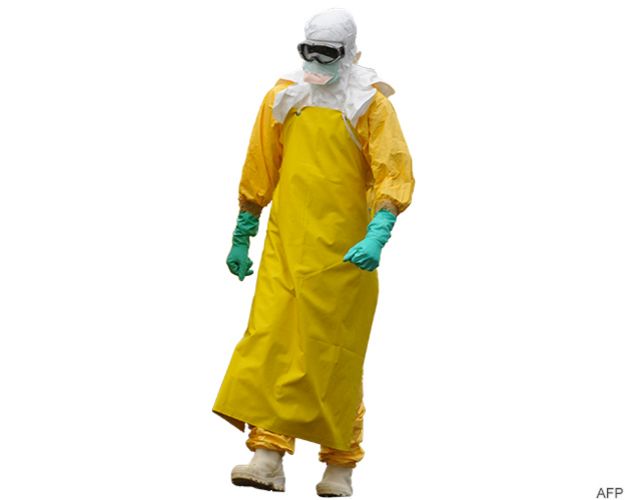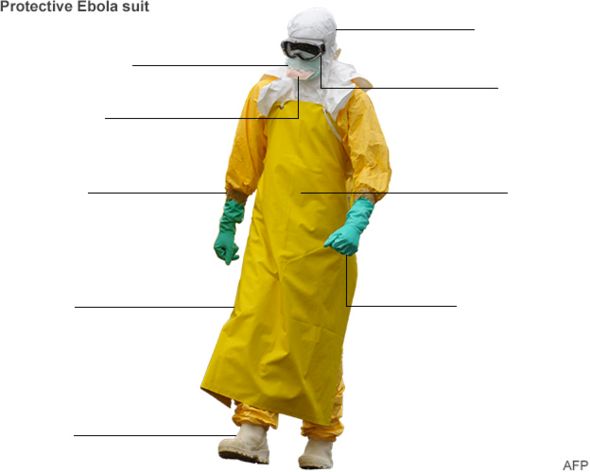http://www.bbc.com/news/world-africa-29648598
16 October 2014 Last updated at 21:53
 Ebola continues to blight the Liberian capital, where this NGO worker (l) takes medication to a quarantined family
'Spike'
Ebola continues to blight the Liberian capital, where this NGO worker (l) takes medication to a quarantined family
'Spike'
 US hearing
US hearing
 Amber Vinson was not supposed to travel on an aeroplane, health officials said
Amber Vinson was not supposed to travel on an aeroplane, health officials said


 Continue reading the main story
Continue reading the main story

Ebola crisis: WHO signals help for Africa to stop spread
Kofi Annan: "Africa could have asked for help much faster and the international community... we didn't need to take months"
The World Health Organization is to "ramp up" efforts to prevent Ebola spreading beyond the three countries most affected by the deadly virus.
Fifteen African countries are being prioritised, top WHO official Isabelle Nuttall told a Geneva news conference.
They will receive more help in areas including prevention and protection.
But former UN Secretary General Kofi Annan has said he is "bitterly disappointed" with the international community's response.
In an interview with the BBC's Newsnight programme, Mr Annan said richer countries should have moved faster.
"If the crisis had hit some other region it probably would have been handled very differently.
"In fact when you look at the evolution of the crisis, the international community really woke up when the disease got to America and Europe. And yet we should have known that in this interconnected world it was only a matter of time."
 Ebola continues to blight the Liberian capital, where this NGO worker (l) takes medication to a quarantined family
Ebola continues to blight the Liberian capital, where this NGO worker (l) takes medication to a quarantined family
In Geneva, the WHO's Dr Nutall said the transmission of the Ebola virus remained intense in Liberia, Sierra Leone and Guinea - the three countries at the centre of the Ebola outbreak.
There was a "spike" in the Guinean capital, Conakry, she said, and "intense transmission" in Freetown, the capital of Sierra Leone.
In the Liberian capital, Monrovia, she spoke of "significant underreporting" and problems with data-gathering making it hard to reach firm conclusions. But there was a drop in the number of cases in Lofa district.
These British army medics are starting their journey to Sierra Leone, as Fergus Walsh reports
Overall, cases were doubling every four weeks, said Dr Nuttall, the WHO's Director of Global Capacities, Alerts and Response, and the death toll was expected to go above 4,500 this week.
Countries in the region must be prepared, she said, listing Benin, Burkina Faso, Cameroon, Central African Republic, Democratic Republic of Congo, Gambia, Ghana, Mauritania, Nigeria, South Sudan, and Togo.
She highlighted four nations directly bordering the worst affected area - Ivory Coast, Guinea Bissau, Mali and Senegal.
"We will ramp up our support to the countries. We will work with them on a plan."
Action will include:
- Rapid response teams
- Engaging at community level
- Training in infection prevention and protection
- Having laboratories in place
In another development, the European Union is to examine whether exit screening at West African airports is effective.
EU health ministers also agreed to try to co-ordinate measures taken at EU airports. Some countries, such as the UK, have introduced screening.

In the United States, questions are being asked about why two nurses who treated an Ebola patient from Africa have themselves become infected.
Thomas Eric Duncan died at the Texas Health Presbyterian Hospital after arriving in the US from Liberia.
 Amber Vinson was not supposed to travel on an aeroplane, health officials said
Amber Vinson was not supposed to travel on an aeroplane, health officials said
Nurses Nina Pham and Amber Vinson both contracted Ebola after treating him.
Both wore face shields, hazardous materials suits and protective footwear as they drew blood and dealt with Mr Duncan's body fluids and it remains unclear how they were infected, officials say.
Amber Vinson was allowed to take a commercial flight after treating him and officials have been contacting the 132 people who flew with her.
A congressional panel has been grilling health officials on how the US is dealing with Ebola cases.
Daniel Varga, the chief clinical officer for the company that runs the Texas hospital, told the congressional hearing "we are deeply sorry" for the "mistakes made" in the way Mr Duncan's case was handled.
The panel's chairman, Tim Murphy, told the hearing "the American public loses confidence each day" in the ability of health authorities to deal with the virus.
He also cast doubt on airport screening, saying those with a fever could avoid it.
But in his opening statement, Centers for Disease Control Director Tom Frieden said everything was being done to prevent transmission of Ebola.
"There are no shortcuts. Everyone has to do their part. We are there to support. We are there with world-class expertise to protect Americans."
In other developments on Thursday:
- Another Spanish healthcare worker, who came into contact with a nurse already infected, is being tested for the virus
- An Air France passenger with a high fever, reportedly from Nigeria, is to be examined in hospital for Ebola symptoms after arriving in Madrid from Paris
- A patient with "Ebola-like" symptoms is being monitored in the US state of Connecticut
- UN Secretary General Ban Ki-moon said just $100,000 had been given to a UN Ebola trust fund which needed $1bn

- Avoid direct contact with sick patients as the virus is spread through contaminated body fluids
- Wear goggles to protect eyes
- Clothing and clinical waste should be incinerated and any medical equipment that needs to be kept should be decontaminated
- People who recover from Ebola should abstain from sex or use condoms for three months
INTERACTIVE
Protective Ebola suit
×
Surgical cap
×The cap forms part of a protective hood covering the head and neck. It offers medical workers an added layer of protection, ensuring that they cannot touch any part of their face whilst in the treatment centre.Goggles
×Goggles, or eye visors, are used to provide cover to the eyes, protecting them from splashes. The goggles are sprayed with an anti-fogging solution before being worn.Medical mask
×Covers the mouth to protect from sprays of blood or body fluids from patients. When wearing a respirator, the medical worker must tear this outer mask to allow the respirator through.Respirator
×A respirator is worn to protect the wearer from a patient's coughs. According to guidelines from the medical charity Medecins Sans Frontieres (MSF), the respirator should be put on second, right after donning the overalls.Medical Scrubs
×A surgical scrub suit, durable hospital clothing that absorbs liquid and is easily cleaned, is worn as a baselayer underneath the overalls. It is normally tucked into rubber boots to ensure no skin is exposed.Overalls
×The overalls are placed on top of the scrubs. These suits are similar to hazardous material (hazmat) suits worn in toxic environments. The team member supervising the process should check that the equipment is not damaged.Double gloves
×A minimum two sets of gloves are required, covering the suit cuff. When putting on the gloves, care must be taken to ensure that no skin is exposed and that they are worn in such a way that any fluid on the sleeve will run off the suit and glove. Medical workers must change gloves between patients, performing thorough hand hygiene before donning a new pair. Heavy duty gloves are used whenever workers need to handle infectious waste.Apron
×A waterproof apron is placed on top of the overalls as a final layer of protective clothing.Boots
×Ebola health workers typically wear rubber boots, with the scrubs tucked into the footwear. If boots are unavailable, workers must wear closed, puncture and fluid-resistant shoes.
Have you been affected by the issues raised in this story? You can share your experience by emailing haveyoursay@bbc.co.uk.
Or comment here:
Send your pictures and videos to yourpics@bbc.co.uk or text them to61124 (UK) or +44 7624 800 100 (international). Or you can upload here.

 Confusing figures
Confusing figures